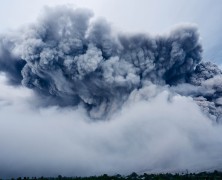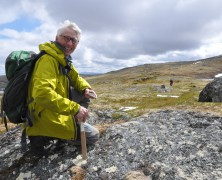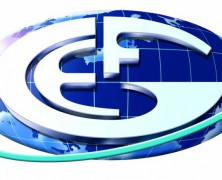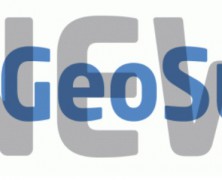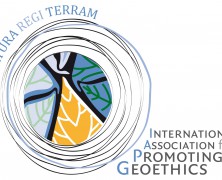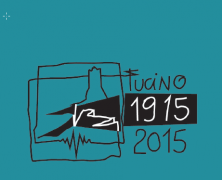The 1815 eruption at Mount Tambora is widely considered the most damaging in human history. It led to global extreme weather change. The harvests failed and 1816 is remembered in Europe as the year without a summer. (https://en.wikipedia.org/wiki/1815_eruption_of_Mount_Tambora) Europe had seen failing harvests since 1812. The extreme summer of 1816 forced people to eat their remaining cattle and horses, famine occurred. The German inventor Karl Drais started to develop a machine that could replace the horse for transportation. In 1817 he introduced “Die Laufmaschine” (Veliocipede). On June 12th 1817 Drais made the first bicycle ride in history, form Mannheim to the Coaching Inn “Schwetzinger Relaishaus”, a distance of 5 miles (8km) (https://en.wikipedia.org/wiki/Karl_Drais) The Geological Survey of Norway will try to initiate an event on June 12th 2017 to mark this 200 years jubilee: The volcano that gave us the bicycle! [Source: NGU – Geological Survey of...
The oldest traces of life on Earth
posted by EuroGeoSurveys
The oldest traces of life on Earth An international team, with the researchers Tor Grenne at the Geological Survey of Norway and John F. Slack from USGS on board, has recently found relics on the world’s oldest known life. These are traces of microscopic organisms that lived at hot springs down on the seabed more than 3770 million years ago. Possibly they can be as old as 4280 million years. By comparison, the age of the earth is around 4600 million years old, and the oldest traces of life on land about 460 million years. The primitive organisms themselves are not preserved, but they can be traced through thin threads and pipe-like structures in fine-grained iron minerals in the rock. The tiny structures have characteristic shapes and branches that correspond to what we find around metal-rich hot springs on long-term dispersal backs on the seabed today. Here, very special bacteria live by oxidizing iron and turning it into rust, a kind of iron oxide that eventually transforms into hematite. The researchers have emphasized systematically to investigate whether the findings may stem from non-biological processes, such as temperature and pressure changes in the rocks after they were deposited. The conclusion is that the structures must originate from microorganisms. Another indication is that along with particular structures are graphite, apatite and carbonate, which are typical of converted biological material, as well as instances of small round structures, so-called rosettes and granules, which are formed during the degradation of bacterial residues on the seabed. These are identical to discoveries in younger rocks through much of the geological history of the Earth, including rocks the researchers have studied in North America, Western Australia and Norway. At Løkken in Central Norway there are microscopic wire-shaped traces of bacteria that...
European Geologist title- Certification of geosciences professionals
posted by EuroGeoSurveys
What is the EurGeol title? The European Geologist title (EurGeol) is a professional title created by the European Federation of Geologists which recognises the ability to deliver a high quality of services within the practice of geology. Title holders have achieved suitable academic training and a level of professional experience, skill and competence to perform tasks within their professional practice. It also means that the geologist undertakes continuing education and training, demonstrating a personal commitment to stay up to date and informed within the sphere of his professional work. Why do I need the title? Professional titles have become important in demonstrating the suitability of a professional to provide geological services. The professional title provides a quality mark to demonstrate to clients, regulators and the general public that the individual is competent to provide geological advice, and allows employers to offer competitive commercial services. To adapt to the current and future challenges within the geo-political framework of the European Union, it is necessary that geologists achieve, and can demonstrate, a high degree of professional experience to be able to respond to the demands of society in practicing their profession. Thanks to the harmonisation of training and experience underlying the EurGeol certification, the title acts as a passport to professional practice in Europe, thereby encouraging free movement of professionals. Download the Brochure Source: European Federation of...
EU-wide survey on 3D modelling activities at Geological Survey Organisation
posted by EuroGeoSurveys
Online poll among European Geological Survey Organisations summarises activities in the field of 3D geological modelling and reveals the current state of progress An online survey was carried out across federal and state geological surveys of Europe between December 2014 and February 2015 to reveal the current state of progress in 3D geological modelling as well as the financial and human resources involved in geological modelling activities. Thirty-six institutions responded to the questionnaire leading to an almost complete coverage of European countries. Results show that 3D geological modelling at geological surveys really took off between 2001 and 2010 and by now, more than half of the participating countries have covered at least 20% of their area with regional scale geological models. In 2014, most survey organisations spent up to 50,000€ on 3D modelling. On average 60% of the total modelling budget are spent on modelling per se, while 10% go to software licence fees, 10% to programming and 20% to model dissemination. Virtually all Geological Survey Organisations in Europe perform 3D geological modelling as part of research projects related to groundwater, mineral resources or geothermal energy. As to the systematic 3D mapping of the subsurface, ten countries / states in Europe stipulate 3D geological models by legal mandate. Only in four of those, there also are legal requirements to follow national standards for 3D data models. While most geological surveys carry out geological modelling by employing their own staff, some have outsourced the task to research institutes and/or universities. Although some modelling activities were undertaken already in the eighties and nineties, the majority of geological survey organisations started 3D geological modelling between 2001 and 2010. Up until now they spent up to ten person-years on modelling. By the end of 2014,...
GEOETHICS AT THE EGU 2015
posted by EuroGeoSurveys
During the EuroGeoSurveys 38th General Meeting, EuroGeoSurveys and the International Association for Promoting Geoethics (IAPG) signed a Cooperation Agreement with the aim of cooperating in a range of themes in the field of geoethics and promoting initiatives and events discussing the ethical, social and cultural implications of geosciences. Starting from the definition of ethics by Aristotle, the IAPG (International Association for Promoting Geoethics) has defined geoethics as “the research and reflection on the values which underpin appropriate behaviours and practices, wherever human activities interact with the geosphere”. Geoethics deals with the ethical, social and cultural implications of Earth Sciences education, research and practice, and with the social role and responsibility of geoscientists in conducting their activities. For the third year the IAPG has organized a session on geoethics at the European Geosciences Union (EGU) – General Assembly, titled “Geoethics for society: General aspects and case studies in geosciences” (session EOS8). The raising interest in geoethics is testified by the growing number of abstracts submitted since 2013. The session will be held on 15 April 2015, from 13:30 to 17:00 in the Room R12 (12 orals) and from 17:30 in the Red Posters Area (30 posters) at the Austria Centre Vienna, and will be convened by Silvia Peppoloni (Italy), Eduardo Marone (Brazil) and Nic Bilham (United Kingdom). The first part of the session, titled ”putting geoethics at the heart of geosciences”, is an overview on general issues of ethics in relation with geosciences, such as geoeducation, geoscience professionalism, scientific ethics, geoethics applied to georesources. The second part is focused on “Geoethics and geohazards”, with particular attention to prepardness strategies, mitigation policies, probabilistic-deterministic views, social impacts, risk communication and disaster management. Information on the session EOS8 are available in the IAPG website: http://www.iapg.geoethics.org/evidence/egu2015. International Association for...
FUCINO 2015 | EGS – EPOS Workshop
posted by EuroGeoSurveys
EuroGeoSurveys will participate to FUCINO 2015 – 6th INIQUA International Workshop. The event will celebrate the centenary of the 1915 M7 Fucino earthquake, one of the most devastating earthquakes occurred in the Apennines. EuroGeoSurveys (EGS) and the European Plate Observing System (EPOS), an integrated solid EarthSciences research infrastructure aimed at promoting innovative approaches, organize a joint Workshop on Tuesday 21 April, 17.00 – 18.30. The Workshop aims at showing to the Fucino 2015 participants the activities carried out in the frame of earth sciences research infrastructure initiatives. EPOS and EuroGeoSurveys representatives will sign a Memorandum of Understanding for future joint collaboration. In particular, EuroGeoSurveys decided to establish a European Geological Data Infrastructure (EGDI), a cornerstone of EGS strategy that supports the development of a European Geological Service. The EGDI will support policy makers, industry and academia in addressing Europe’s societal challenges by making interoperable geological data and information available in a uniform way. One of the most obvious user groups for the geological information is EPOS, which will be implemented in the coming years and aims at creating a pan‐European infrastructure for solid Earth science to support a safe and sustainable society. Therefore the MoU purpose is to ensure a long-term cooperation between the two initiatives regarding integration and exchange of data, information, systems and knowledge. In that way the value of data and infrastructures are optimized to serve the interests of all potential users of the two systems to the widest possible extent. The EPOS will invite the participants of the forthcoming EGU General Assembly to the EPOS Townhall Meeting (TM8) on Tuesday April 14 2015 from 19:00 – 20:00 in Room B8. The meeting will discuss about the relevance of integrating research infrastructures and will be a forum for a broad debate...

